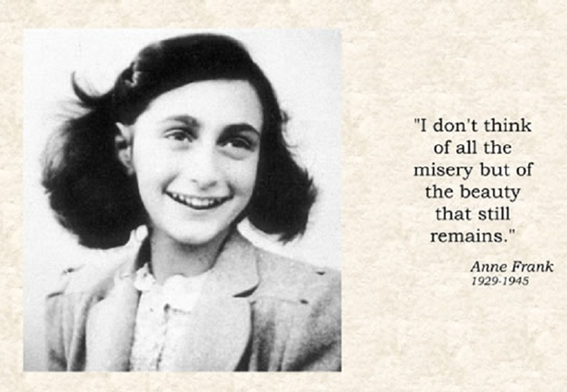Anne Frank was born in Frankfurt, Germany in 1929. She moved to Amsterdam in 1930, where her father worked, because anti-Jew laws were put into place in Germany. In Holland Jews were treated as equals. These rules were put in because Hitler had an image of a perfect German in his head (Aryans), and Jews, gypsies, and other races were treated differently because the Aryans were considered the best. Jews had to wear a special star if they were over the age of 6 to show what they were.
On May 10th 1940 Holland was invaded by Germany. Shortly
after the invasion Anne and her family tried to emigrate to Britain and the
U.S.A but failed. It eventually became too dangerous for them in Holland, so
they went into hiding. The secret hiding place was in an attic above Otto
Frank’s (Anne's dad) work. It wasn't only for the Franks but for the Van Daan
family (Hermann, Petronella and their son Peter) and Albert Dussel. Hermann Van
Daan worked for Otto Franks business.
Otto Frank told a few people he worked with that they were
going into hiding and many agreed to help them. One of them, called Miep Gies,
worked as an office assistant and became really good friends with the Frank
family. When they went into hiding she agreed to them food and offered
friendship, even though she knew she could be killed if they were caught. When
the Franks were caught she went straight to the annex where they were hiding
and found and kept Anne’s diary.
On the 4th August 1944 the secret annex was raided by the
Germans and they were sent off to concentration camps. Anne went to Westerbork
transit camp and then to Auschwitz-Birkenau with her sister Margot, her mother
Edith, Peter Van Daan, Hermann Van Daan and Petronella Van Daan. Albert Dussel
also went with Anne but was then deported to Neuengamme concentration camp near
Hamburg and died. Otto went to
Auschwitz-Birkenau and managed to avoid selection for the gas chambers
and survived until the camp was liberated in January 1945. Anne and her sister
Margot died of Typhus a few weeks before the camp was liberated by British
troops.
Otto was the only survivor of the camps and when he came
back, Miep gave him Anne’s diaries. He the decided to get them published, not
thinking that a diary of a young girl would ever be this big. Anne’s diaries
are sold in 67 different languages and 10 years after publication in 1947 over
30 million had been sold.

No comments:
Post a Comment